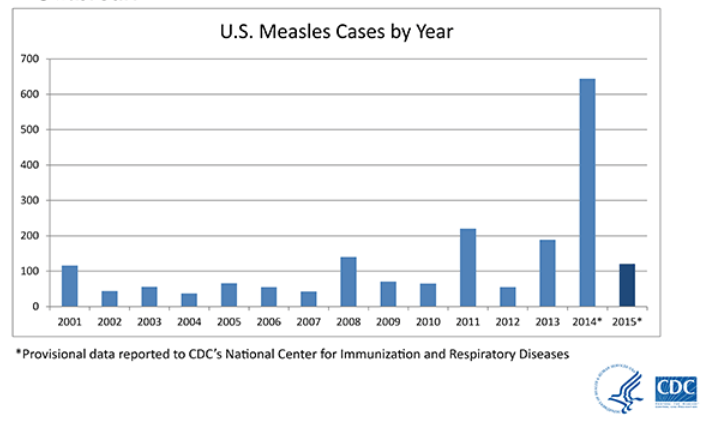To vaccinate or not is the big question. We are not going to take sides on this hotly debated and very personal issue regarding MMR vaccines. We simply want to provide you with some information and helpful links so that you can start researching the topic.
Most of the facts and figures presented are from the CDC website. It should be noted that this government entity is not infallible and is not above politicizing issues, especially with this current administration. We saw this with the Ebola problem this past summer and some are claiming that the CDC is downplaying a connection between the MMR vaccinations and a link to autism in african american boys. (Watch the video below for details on this.)
- Measles vaccines are very effective, but not 100% effective.
- One dose of the measles vaccine in 93% effective.
- Two doses is 97% effective. Most kids get two doses.
- Dose one is typically administered at 12-15 months
- Dose two is typically administered at 4 – 6 years.
- Children under 12 months old are too young to get the vaccine whether their parents are pro-vaccine or not. This leaves infants vulnerable.
- Statistically, 3 out of 100 fully vaccinated people will get the measles if exposed.
- Fully vaccinated people who get the measles typically get a more mild case and are less likely to spread the disease.
- Before the vaccine program started in 1963, the measles were very prevalent.
- 3 to 4 million people contracted the measles each year.
- 48,000 were hospitalized.
- 4,000 developed encephalitis (brain swelling)
- 400 – 500 people died.
- Measles were declared eliminated from the US in 2000 due to a strong vaccination program.
- The vaccination coverage varies from state to state, county to county and city to city.
- In 10 states, 95% of children 19-35 months had received at least one dose.
- In 17 states, less than 90% of children of that age were vaccinated.
- In some communities there are large pockets of like minded anti-vaccination people.
- According to the CDC, the coverage needs to be 95% or above in all communities to prevent outbreaks.
- Despite the elimination of measles due to the MMR vaccine, there are still some cases each year. These cases are brought to the US by unvaccinated travelers (US or foreign) to and from Europe, Africa, Asia and the Pacific. The outbreak in 2014 was traced back to the Philippines.

- Measles in the US has been on the rise for two reasons:
- There have been more measles cases than usual in other countries.
- Measles are spreading in some US communities due to clusters of people who choose not to have the MMR vaccination.
- The current Disneyland outbreak currently includes 121 cases in 17 states and Washington DC.
- These states include, Arizona, California, Colorado, Delaware, Illinois, Michigan, Minnesota, Nebraska, Nevada, New Jersey, New York, Oregon, Pennsylvania, South Dakota, Texas, Utah and Washington.
- Of the California residents who contracted measles first. 83% were unvaccinated (some too young to be vaccinated yet), 14% were vaccinated and 3% were partially vaccinated.
- The CDC recommends that unvaccinated people should stay clear of crowded places where there are a lot of foreign travelers like theme parks and airports. The disease spreads the easiest when it reaches a large group of unvaccinated people.
- 31 bills were introduced between 2009 and 2012 that would have made exemptions from vaccinations easier, but all were defeated.
- 3 out of 5 bills aimed at making exemptions harder were passed.
- The link between the MMR vaccine and autism started in a 1998 study in the British Medical Journal by Andrew Wakefield.
- That study has been debunked by many.
- Wakefield falsified data to support his hypothesis.
- Wakefield was hired as a consultant by lawyers suing vaccine manufacturers. Research firm Sambla Sweden dug into the facts and discovered financial compensation was $750,000. This was considered a conflict of interest.
- The British Medical Journal eventually retracted the study.
- The General Medical Council called Andrew Wakefield irresponsible and dishonest.
- Andrew Wakefield lost his medical license.
- The results could not be replicated by other labs and a decade of subsequent research has not found any connection between the MMR vaccine and ASD.
- Andrew Wakefield comments on the current “Disneyland” outbreak.
- Autism Speaks recommends that all kids get the vaccine.
- Vaccines are the only pharmaceutical products that the government recommends and mandates and completely indemnifies (protects from liability).
- In 1986, Congress passed the National Childhood Vaccine Injury Act that gave partial liability protection to vaccine companies.
- The companies argued that they needed protection from lawsuits to keep the price of the vaccines affordable for the public.
- If the law was not passed, the companies would have stopped making vaccines.
- Pediatricians also got liability protection.
- In 2011, the Supreme Court basically said the vaccines are unavoidably unsafe for some but for the greater good there shall be no lawsuits against manufacturers.
- The debate continues.
- Follow the website the Age of Autism to get the Anti-vax side of the story.
- Age of Autism is a website that gives voice to those who believe autism is an environmentally induced illness, that it is treatable, and that children can recover.
- Another source of information is the National Vaccine Information Center.
- Read Ask 8 Questions: What you need to know before and after your vaccinate your child or yourself.
- Contains a list of questions to ask your pediatrician.
- Gives tips on what to do before and after a shot, including record keeping.
- Lists potential vaccination side effects.
- Read Ask 8 Questions: What you need to know before and after your vaccinate your child or yourself.
- There are some who want Merck, the manufacturer of the MMR vaccine, to split up the vaccine into three monovalent vaccines.
- Merck did manufacture 3 monovalent vaccines for measles, mumps and rubella. They discontinued manufacturing this option in 2009.
- The Health Protection Surveillance Center discusses separate vaccine option in a post called MMR versus Separate Single Vaccines for Measles, Mumps and Rubella.
- Watch this Ben Swann Video that debates both sides.
- Follow the website the Age of Autism to get the Anti-vax side of the story.
The Kidmunication Point
Study both sides of the debate, talk to your pediatrician and make an informed decision that is best for you and your family. Debating this issue is healthy because it will lead to safer and safer vaccines in the future.



You forgot to mention that one of the leaders in the non-vaccination movement, Jenny McCarthy, actress, has since withdrawn all her “emotional evidence” on this matter. Not covered very well in the media.
I did read that. Thanks for adding to the conversation.